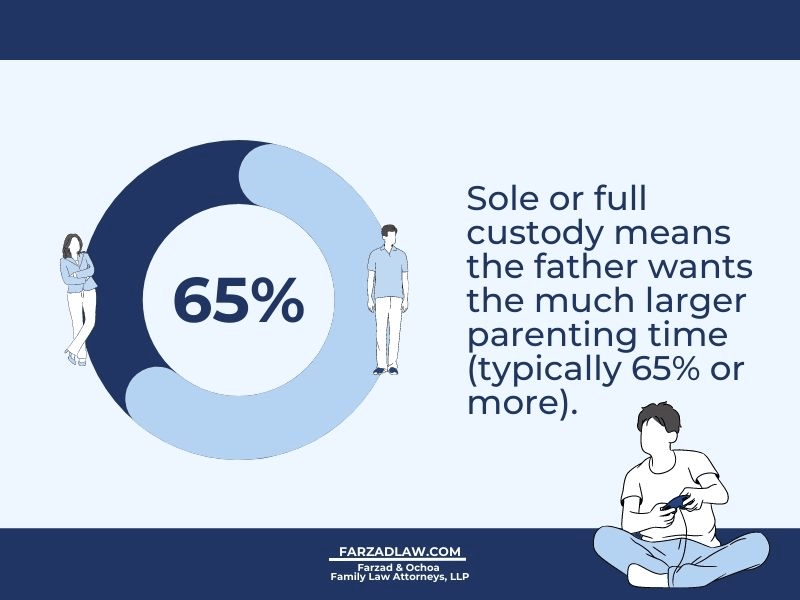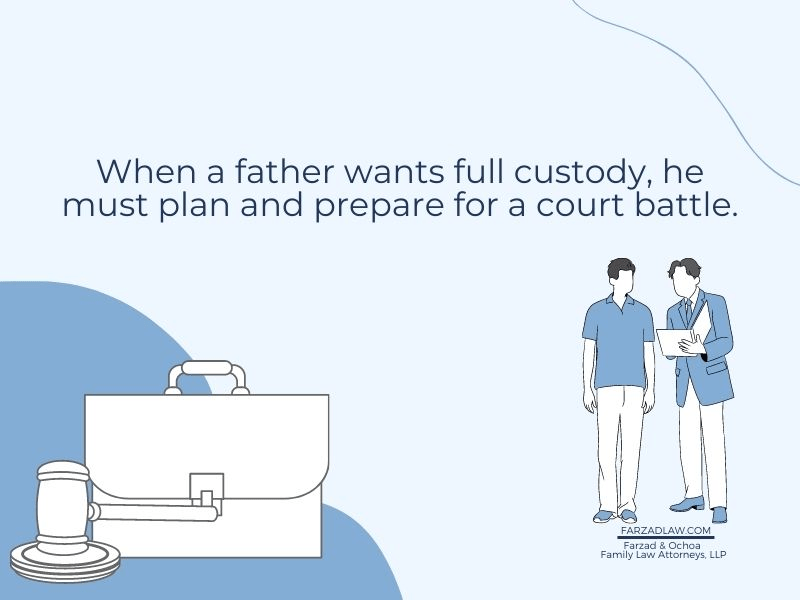Expert Tips on How Fathers Can Build a Custody Case
Historically, when parents went through a divorce, child custody was thought of as a sole responsibility. It wasn’t expected that parents could share the role (likely because of the emotional nature of divorce). As a result, the courts adhered to “the rule of one”—which is the idea that child custody must go to one parent in divorce while the other parent is a visitor.1 The parent who often recieved custody was the mother, thanks to something called the tender year’s doctrine. Established in the 1800s, this family law principle indicated that mothers were the most capable, compassionate parents.123
Under this assumption—absent extreme evidence of the mother’s unfitness—young children never went to the father instead of the mother.1
But as our understanding of care and parenthood has evolved, so too have custody agreements. Society has historically devalued fathers as parents—which has impacted how custody decisions are made. Fathers pursuing custody may have to overcome popular engrained ideas that they lack parenting qualities that courts implicitly or explicitly assume the mother has. While this is an additional burden, it isn’t insurmountable.
Any parent seeking custody must meet the same criteria—here’s what you need to know.
Types of Custody
Over the years, types of custody agreements have evolved alongside parenting responsibilities. Broadly, there are two categories of custody awards, either of which can be held jointly or solely between the parents: physical and legal.4 “Legal custody” basically means that the parent has all legal right over parenting responsibilities. They can choose what religion the child will follow, for example, or give permission for a surgery.5 Conversely, “physical custody” looks at parenting time. This might mean that the child resides with that parent, or that the child legally needs to spend two nights a week with that parent, for example.6
These arrangements vary between divorced parents. For example, some states split up parenting responsibilities, giving one parent jurisdiction over education and health while the other gets jurisdiction over religion. Or, the court can decide that everything must be a joint decision between both parents. The same goes for parenting time awards. “Physical custody” does not necessarily mean that the child resides with one parent full time and never sees the other.
Sole custody is the historic “rule of one,” often awarded today when a parent is deemed unfit to raise their child. Unfitness is a high bar to meet, and the parent seeking sole custody must prove unfitness in order for sole custody to be granted. If the court decides sole custody, it will often grant the other parent visitation rights. This gives the other parent legal right to visit with the child.7
A joint custody arrangement is most common. This is when the parents jointly share physical and/or legal custody and come to an agreement on when the child will visit each parent and work together on major decisions.5
In most cases, custody decisions are made on a continuum. For instance, both parents may have the child live with them on alternating weeks (joint physical custody), whereas one parent may have decision-making authority regarding the child’s medical care (sole legal custody).1
While the standards vary from state to state, most courts follow the “best interests of the child” standard when tasked with custody proceedings. Under this principle, there are several factors that courts consider, among them: the wishes of the child’s parents; the wishes of the child; the interaction and interrelationship of the child with their parents; the child’s interaction and interrelationship with siblings, and any other individual who may significantly affect the child’s best interests; the child’s adjustment to their home, school, and community; and the mental and physical health of everyone.8
How Fathers Can Build a Custody Case
It is fully possible for fathers to get sole custody of their children. In order to do so, first and foremost they must establish the unfitness of the mother. The court must also feel that the father meets the “best interest standard” of the child. That is to say—is granting the father full custody what is best for the child?
In addition, there are aspects of a custody case where fathers may have an additional burden to prove that mothers do not. These include paternity, the primary caretaker role, and home environment quality.
Paternity
There are two ways to determine paternity: biologically or legally. Under the Uniform Parentage Act, a man is an “alleged father” if they have not established biological paternity or achieved presumed fatherhood.9 The law often distinguishes between the legal and biological recognition of paternity: “Where such births result from sexual intercourse between consenting adults, genetic ties almost always themselves determine legal motherhood, but often only help determine legal fatherhood.”6 Legal parentage is required to receive the constitutional rights of a father.
In cases where the father is not married to the mother, but another man is, courts have ruled that fatherhood may be determined by who the mother is married to, rather than biology.10 If a father is not married to the mother, or if he does not sign an acknowledgment of paternity, he cannot be granted custody or visitation rights.6
Primary Caregiver Role
A primary caregiver is a person who consistently is responsible for the housing, health, and safety of another.11 In custody proceedings, courts assume the primary caretaker is experienced and knowledgeable regarding the child’s educational needs, medical needs, and more. As family dynamics shift from stay-at-home mothers and working fathers, there may be a presumption on who mostly handles the roles of primary caretaker. Fathers must show their engagement in caring for their child academically, medically, and in other critical areas.
In families where the mother does stay home or work less, there is a preconceived notion that children’s bond with the stay-at-home parent is stronger than their bond with the working parent. As part of making decisions within the child’s best interests, a change in primary caregiver is typically considered as causing at least some distress to the child.12
Because of this, courts are hesitant to change a child’s primary care provider unless it is in the child’s best interest.12 The non-primary caretaker parent should offer some other evidence counterbalancing this finding, such as the child’s aptitude to adjust to new environments.
The mere fact that a parent balances work and family needs should not be determinative in decisions regarding their aptitude to connect with their children. Therefore, it is necessary to examine the working-parent and child relationship on an individual basis. Doing so would provide that parent with the opportunity to demonstrate the strength of their relationship during a custodial proceeding.
Mothers, whether they work or not, statistically tend to have more responsibility for parenting aspects such as attending parent-teacher conferences, school plays, doctor visits, playing at parks, helping with homework, and other activities. In fact, studies have found that 48% of fathers in the U.S. participated in their children’s school activities once a year or less.13
A father seeking custody may need to overcome this and demonstrate to the court that they participate in all aspects of parenting, not just financially. Courts appear to want the primary caretaker to be an experienced and knowledgeable parent who knows how the child learns best, their major health needs, etc.8 Demonstrating involvement in these crucial aspects of care is important.
Quality of the Home Environment
The quality of the home environment is another element that may further burden fathers due to beliefs about their parenting when compared with mothers.12
When looking at this element, the courts consider things like intellectual, emotional, and cultural factors. Courts weigh the quality of the home environment for both parents, however, when neither home is harmful in any way, courts will also take into account which home is simply better.12 Does one home sit in a better school district? Or does it provide more opportunities for the child’s growth and development? Sometimes, the determination of “better” is as simple as that.
In addition, there may be incorrect assumptions about the father’s capability to meet the child’s emotional needs. Thus, a father should demonstrate his understanding of his child’s emotional needs. The emotional wellness of a child is an important factor in determining where a child should live.
A Word From Verywell
There is no denying that society does not value fathers enough, but the fact is that fathers can be just as important as any other parent in a child’s development. Studies even show that fatherless children live an average of four years less.14 In addition, children who feel close to their father are twice as likely to enroll in college or find stable employment after high school, 75% less likely to have a teen pregnancy, 80% less likely to end up in jail, and half as likely to have multiple depression symptoms.14
When it comes to fighting for your child, these studies, as well as many others, can speak to the importance of the fight. Though it may be more difficult for father’s to build a custody case, it is not impossible. Consider the key elements of establishing fitness and work with a qualified legal team to establish them for the courts.
How to Win Child Custody for Fathers Who Deserve More Parenting Time
There are proven ways to help fathers win equal or primary child custody
The question is how to win child custody for fathers. The answer is by focusing on the child’s or children’s best interest and showing the court why you, the father, are equally fit or better fit for parenting.
Before we dive further into this answer, we will explore the concept of “winning.”
We know what fathers mean when they talk about “winning” child custody
When a father thinks about “winning” a child custody case, he already makes a mistake of how he looks at child custody in California.
Good fathers mean getting a child custody order they believe to be in the child’s best interest. Poorly intentioned fathers mean using the child as leverage for child support or getting some foolish revenge against the mother. That is exactly why the word “winning” is incorrect. A victory in a child custody case can mean completely different things to different fathers.
We tailor the “winning” child custody concept toward a child’s best interest
We will refer to the concept of winning but we will tailor it so you understand what it may mean for a good father. We will focus on a father winning equal custody or primary custody.
Ultimately, however, I want you to get that word out of your head when it comes to custody and instead rephrase it with something like this: “how can I get a court order consistent with my child’s [or children’s] best interest?”
How to win “equal” child custody and parenting time for fathers
Child custody includes legal custody and physical custody. Physical custody is the label attached to the amount of parenting time. The amount of parenting time is what matters, not the label.
Winning joint legal custody is common
Courts usually grant joint legal custody to both parents unless the court believes one parent is not fit to share in the decision-making process concerning the child’s health, safety or education. Examples of parents losing legal custody include those situations that involve documented domestic violence, child abuse, serious substance abuse, serious child neglect, etc.
Read our guide on how a mother can lose custody of her child
Winning joint physical custody for fathers requires courage and a child focused strategy
For a father to win joint physical custody and equal parenting time requires the father to show the court such a schedule is in the child’s best interest.
Fathers mistakenly believe they have a higher burden than the mother does. They sometimes believe the court will award primary custody to the mother unless the father can show the court why it should do something different. That is not California law.
Both the father and the mother start in the same place unless some of the issues we discussed above apply. Absent those, neither parent really has a burden of proof to overcome anything.
Both parents should prepare to advocate their position to the court and show the court why the parenting plan they propose is in the child’s best interest.
The four ways fathers can win joint physical custody and equal parenting time
Here are some facts a father can show to help him obtain equal parenting time.
- The father has the same or similar amount of time to care for the child,
- The father has the same or similar parenting skills as the mother,
- The father is able to dedicate the same or similar amount of time to the child’s education and extracurricular activities, and/or
- Neither the mother nor the father have a history that would evidence one or both of them are a danger to the child.
Did you notice the common theme? The theme is there is nothing consistent with the child’s best interest that gives the mother a distinct advantage over parenting and therefore parenting time.
Status quo during the relationship is not the most important factor
Some mother argue they were the primary custodial parent during the marriage and that is how it should stay. That is not what California family law states.
While stability and continuity is a factor when a court determines parenting time, is not the only factor or even the most important factor.
Our laws recognize fathers and mothers may have had a different arrangement during the relationship and neither is bound for the rest of the child’s minority to that arrangement, as if it was some kind of contract.
It is normal for a parent who was the primary custodial parent to remain the primary custodial parent in the short term after separation. However, if the father is capable of caring for the child on an equal parenting schedule, there is no reason for that temporary arrangement to become a permanent one.
How to win primary custody for fathers
I use the word “primary” instead of “sole” custody because parents sometimes think sole custody means 100% parenting time to one parent and therefore 0% parenting time to the other parent. That is not what sole physical custody means in family law. Regardless, we will use the word primary because most people understand “primary custody” better.
Read our guide on how to get full custody as a father
Does the father have to show a significant change of circumstances to win primary custody?
If the father has equal parenting time now because of a court order and wants to win primary custody, he will likely need to show a significant change of circumstances since the last court order that awarded equal parenting time. That however depends on how much primary custody the father wants. Let us use percentages as an example.
If the father has 50% parenting time now and wants to increase his parenting time to 60%, that may not be significant enough to require an actual showing of a significant change of circumstances. In that situation, the father may only need to show the additional parenting time is in the child’s best interest.
However, if the father wants to go to 80% parenting time, that is a significant jump and the father will need to show a significant change in circumstances from the last court order.
All of this assumes the last court order is a judgment or post judgment final child custody order. Temporary orders while the divorce or parentage case is pending require a “best interest” showing and without the need to show a significant change of circumstances.
What does significant change of circumstances mean?
Fathers often ask what a significant change in circumstances actually means. There is no specific definition for it. However, an easy way to think about it is this.
- Something significant that occurred after the last court order,
- That significant event justifies coming to court and telling the court the situation today is very different from the situation that existed when the last court order went into effect, and
- The court should modify custody or parenting time as a result.
That may be an event that provides one parent a greater ability to spend time with the child, that significantly limits a parent’s ability to spend time with the child, an action by a parent that significantly affects the child’s health, safety, education or general welfare, etc.
Custody terms and laws are written to give the judge significant discretion
By now, you may realize words like “best interest,” “significant change of circumstances,” and health, safety, education and general welfare are broad. Fathers who want to win a child custody battle must have the facts that support their position and an attorney who can advocate it well.
They therefore need a great attorney to represent them.
When a court has broad discretion and the issues before the court are not black or white, your choice of advocate matters more than you may realize.
How Can a Father Get Full Custody?

What Is the Standard for a Father’s Custody Rights?
In Texas, custody and visitation rights are decided based on what is in the best interests of the child. Accordingly, the court will consider the following factors in allowing custody privileges to a father:
- Your Mental, Emotional, and Physical Health. As the child’s father, you need to be in sufficient physical, mental, and emotional condition to support your child. Substance abuse issues are evidence that you are not adequately fit to care for your child. So are prior criminal convictions and evidence of abuse, neglect, or abandonment of your spouse or child.
- Your Willingness to Be an Involved Parent Who Puts Your Child’s Needs First. A father who can demonstrate that he spent meaningful time with his child has a better chance of gaining custody. The same goes for evidence that you put your child’s needs ahead of yours. You must show that you’re willing and able to have a relationship with your child that serves their best interests.
- The Amount of Time Your Child Currently Spends With You. Courts will want your child’s life to suffer as little disruption as possible. So judges will prefer that your custody schedule matches the amount of time you currently spend with your child currently.
What You Need to Get Full Custody
When it comes to the question of how can a father get full custody, the help of an experienced child custody attorney is crucial. They can guide you through the process and arrange for everything you need to prove your case. This includes gathering expert witnesses and documentation of child abuse or abandonment by your child’s mother. You will also need evidence that your child mother’s behavior is having a detrimental effect on your child.
Are There Alternatives to Full Custody?
Texas courts are becoming more and more aware of how important it is for children to have their fathers involved in their lives. But the reality is that Texas courts are reluctant to take away any parent’s right to visit their child — especially the child’s mother.
The court may more easily agree to a custody or visitation arrangement where both parents share parental responsibilities. If you have concerns about your child’s mother’s ability to care adequately for your child, you could seek the following alternatives:
- Limited or Supervised Visitation. You could agree to restrict your child’s mother’s overnight visits if she provides an unsafe environment for your child. This requires proof that your child’s mother abuses drugs, engages in criminal activity, or otherwise neglects your child. You could also arrange for your child’s mother’s visitation to be supervised by a third party.
- Unilateral Decision-making Authority. You could also ask the judge to grant you decision-making authority. This requires proving that your child’s mother is unable to make decisions in the best interest of your child.
- Negotiated Custody Plan. You could work with your ex to work out a parenting plan that gives you nearly complete custody. The agreement should allow your child’s mother to have some visitation rights. The agreement should also include a provision that allows your child’s mother to modify their custody rights in the future. cited alsandorlaw
You want to know how to get full custody as a father?
Get ready because the answer may surprise you.
When a father wants full custody, he must plan and prepare for a court battle.
We should know. We have represented many fathers who found themselves in custody battles, sometimes with an unrelenting mother, and we still helped those dads prevail.
What you read here is not a magical formula on getting full custody as a father. There is no such thing. Instead, this article will focus on the much needed dose of common sense and California law.
Why? So that you do not allow yourself to get suckered in by those who oversell themselves as “fathers rights attorneys” as if they somehow have a special knowledge of the law or some secrets on how to get full custody as a father.
Getting full custody as a father focuses primarily on one thing
The focus is the children’s best interest. That best interest standard means the child or children become the court’s focus, not you and not the mother.
And if the family law judge will focus on the children’s best interest, then you must too. How? Keep reading.
We are ready to strategize and give you great legal advice when you are ready to speak with us about your situation.
First, here is an introductory video to our guide we hope you will enjoy
Family Code 3040 and how it helps fathers get full custody
The first part of Family Code 3040 reads:
(a) Custody should be granted in the following order of preference according to the best interest of the child as provided in Sections 3011 and 3020:
(1) To both parents jointly pursuant to Chapter 4 (commencing with Section 3080) or to either parent. In making an order granting custody to either parent, the court shall consider, among other factors, which parent is more likely to allow the child frequent and continuing contact with the noncustodial parent, consistent with Sections 3011 and 3020, and shall not prefer a parent as custodian because of that parent’s sex. The court, in its discretion, may require the parents to submit to the court a plan for the implementation of the custody order…
The law specifically forbids bias. The reason a father who wants to get full custody needs to let this issue go is it does nothing to help him with the ultimate goal. It either becomes a built-in excuse, a distraction or both. None of those help a dad who wants to get full custody of his child or children put on a persuasive case consistent with the facts and law. If you mentally defeat yourself before you step into a courtroom, you are likely going to lose when you get there.
How to get full custody as a father requires a dad to first know what full custody means
There is a big difference between joint and full custody (also called sole custody).
Joint custody can be shy of equal parenting time (although not by much) or equal parenting time. Sole or full custody means the father wants the much larger parenting time (typically 65% or more).
The strategy changes between joint versus full custody because, with full custody requests, family law judges will want to know why the father believes he is better suited to primarily care for the child.
In other words, the judge will want to know why full custody to the father is in the child or children’s best interest.
With joint custody requests, the focus is more on why it is in that best interest to share parenting time.
Is one much harder to get?
That depends on the facts. If the mother and father are both good parents, neither is a danger to the child and both have the reasonable time to dedicate to their parenting, joint custody makes more sense.
What if the mother refuses to co-parent, disparages the father to the child or children, makes false allegations of abuse or neglect or is alienating the children? Then the father should seek full custody.
What we do at our family law firm is evaluate the facts with the law and, in collaboration with the father we represent, decide together whether it makes sense to ask for joint or full custody.
Now, let us look at some specific considerations.
When evaluating how to get full custody as a father, we need to look at the “time” you have for parenting
The traditional American marriage still has a husband and father who works full-time and a wife and mother who either works less hours, earns less pay and/or does not work at all. While this is less common today compared to decades ago, it still pervades the majority of divorce cases we see.
For fathers who have full-time jobs and young children who are not yet in school, the practical problem and fear of not getting quality time with the children is an issue near and dear to the dad’s heart.
Thus, it is important that fathers with full-time or heavy work schedules obtain a custody and visitation schedule that maximizes the quality time with their children.
What is quality time for fathers who want custody?
Quality time includes days that the father does not work such as weekends as well as evenings during the week. Vacation and holiday time is a critical part of a working father’s schedule. Depending on the children’s ages, frequent and regular contact (even in short bursts of time) may be a must to continue the bonding process and ensure the child does not become distant from the father.
This is where parenting guidelines help. Here are three of them:
-
Orange County, CA Parenting Guidelines Download Here
-
Los Angeles, CA Parenting Guidelines Download Here
-
San Diego, CA Parenting Guidelines Download Here
What about custody for fathers when children are bonded with both parents?
In situations where both the father and mother work full-time and the children are equally bonded with both parents, no special preference should be given to the mother in the custody schedule.
If two parents have very similar work schedules and it is otherwise in the children’s best interest to spend equal time with the parents, any day care or other childcare arrangements should be equally made between the parents so that both parents enjoy equal time with their children when they’re not working.
What about custody for fathers with heavy travel schedules?
For fathers who travel extensively due to their work schedules, flexibility and make up time is an important part of any custody and visitation schedule. If a father is going to miss one or more weeks of time with their children, a custody and visitation order can layout how the time will be made up after the father returns from the business trip.
Bonding with your children is a big part of getting joint or full custody for fathers
A custody order with frequent and regular contact does not just happen because you want it. If, during your marriage, you have not spent very much time with your children and are not bonded with them, you face an uphill climb if you intend to suddenly, after separation, get 50/50 custody.
That however does not mean you should give up on your children and take whatever custody and visitation schedule is offered to you.
Fathers need to make their children a priority in their lives if they want joint or full custody.
For fathers in such a situation, it is time you make the choice. Are your children a priority in your life or not?
If you answered yes to this question, you must start to act consistent with your answer.
How do you do this? You start by spending your actual visitation time with the children. That means you do not pawn off the children to your parents, daycare facilities or babysitters. That means you keep the children’s routines or add to them so that the children not only feel comfortable at your home but also look forward to coming there.
Fathers who want custody but do nothing when the mother refuses to co-parent and cooperate make a serious mistake.
In addition, so long as you intend to follow through, you must ask the children’s mother for additional time through a cooperative and reasonable tone. If the children’s mother refuses to agree to additional time, one of the worst things you can do is to do nothing.
In such a situation, once you are able to establish that you spend time with your children and can handle the additional time, hiring an experienced child custody lawyer is a good idea so that you can bring to the courts attention all of these facts as well as the mother’s refusal to co-parent and act in the children’s best interest.
Remember that California Family Code 3020(b) specifically states that it is the public policy of this state:
The Legislature finds and declares that it is the public policy of this state to assure that children have frequent and continuing contact with both parents after the parents have separated or dissolved their marriage, or ended their relationship, and to encourage parents to share the rights and responsibilities of child rearing in order to effect this policy, except where the contact would not be in the best interest of the child, as provided in Section 3011.
Take those words seriously. It is the law.
How to get full custody as a father when faced with an abusive or neglectful mother?
If the mother physically or emotionally abuses the children or neglects their basic care, you should request full custody.
You will need evidence of the abuse or neglect.
We discuss the evidence gathering process more below.
What makes these types of abuse and neglect cases different is the option to get law enforcement or social services involved.
If the mother is physically abusing the children or neglecting their basic care, consider whether you should contact the police or social services.
They may be able to help faster than the family court, especially in more serious cases.
Also consider that if you are aware of child abuse or serious neglect and you do nothing, it may be you who gets into the cross hairs of law enforcement or child protective services.
Parents have an affirmative duty to protect their children and parents who are aware of abuse and neglect, and do nothing, may risk losing their own child custody privileges.
How to get full custody as a father when faced with the alienating or uncooperative mother?
This is the hardest thing a father who wants to get full custody can go through. Unfortunately, although it is not necessarily gender specific, certain parents refuse to reasonably communicate, co-parent and even go as far as alienating the children from the other parent.
In such situations, your strategy may have to change if you intend to act with your children’s best interests in mind. Any parent, including a mother, who refuses to co-parent and alienates the children (which can come in many forms including false allegations of abuse as well as psychological abuse), should not have joint custody of the children.
These types of cases require discipline, diligence and a father with the courage to ask for full custody
We believe parents who engage in such conduct are a danger to the children and, if the conduct does not stop, it may escalate as a child gets older, thereby causing a greater division between the non-alienating parent and child relationship.
For fathers who seek full custody, there is good news. You have numerous options available to you including but not limited to:
- Using the family law discovery process to flesh out the mother’s allegations,
- Requesting and having the court order a forensic psychological evaluation (often called a child custody 730 evaluation),
- Having the court order a formal child custody investigation, and
- The appointment of a lawyer for the children.
There are other options in addition to the above. Our family law firm employs these and other strategies for fathers who want to get full custody from mothers.
It is important for you to know, as a father, that if you do nothing, the chances of you being able to ever get joint or full custody of your children may reduce significantly.
That is because children who are consistently alienated from one parent overtime may, as they get older, not want to spend time with that parent and, once the child reaches a certain age, California law does allow the child to have a voice in the family law process and allows the child to state a preference in custody cases.
Sanctions and Attorney Fee Recovery for Bad Actors
FAM § 3027.1 – Attorney’s Fees and Sanctions For False Child Abuse Allegations – Family Code 3027.1 – Click Here
FAM § 271 – Awarding Attorney Fees– Family Code 271 Family Court Sanction Click Here
Awarding Discovery Based Sanctions in Family Law Cases – Click Here
FAM § 2030 – Bringing Fairness & Fee Recovery – Click Here
Abuse & Neglect – The Reporters (Police, D.A & Medical & the Bad Actors)
If You Would Like to Learn More About: The California Mandated Reporting Law Click Here
To Read the Penal Code § 11164-11166 – Child Abuse or Neglect – California Penal Code 11164-11166
Article 2.5. Child Abuse and Neglect Reporting Act (CANRA) Click Here
Download the Mandated Reporter form below click link
Mandated Reporter FORM SS 8572.pdf – The Child Abuse
ALL POLICE CHIEFS, SHERIFFS AND COUNTY WELFARE DEPARTMENTS
INFORMATION BULLETIN click here Officers and DA’s for (Procedure to Follow)
It Only Takes a Minute to Make a Difference in the Life of a Child


